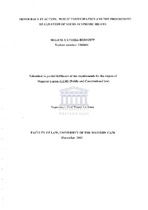| dc.contributor.advisor | Le Roux, Wessel | |
| dc.contributor.author | Rossouw, Melene Cynthia | |
| dc.date.accessioned | 2018-10-15T13:58:29Z | |
| dc.date.available | 2018-10-15T13:58:29Z | |
| dc.date.issued | 2012 | |
| dc.identifier.uri | http://hdl.handle.net/11394/6460 | |
| dc.description | Magister Legum - LLM | |
| dc.description.abstract | While the Constitutional Court has repeatedly enforced a duty to meaningfully engage with
communities where the provision of basic social services and goods is at stake, uncertainty
about the form, extent and quality of community engagement continues to negatively impact
on development projects. The much publicised "toilet saga" in the Makhaza informal
settlement in the Western Cape is a telling example. This problem is partly attributable to a
lack of clarity about the legal foundations and basis of this duty. The research project
explores such an approach by clarifying the proper legal and constitutional basis of the right
to meaningfully participate in development projects and the delivery of basic social goods,
and in so-doing, to place public participation in socio-economic rights on a sound legal and
constitutional foundation. The project further seeks to develop a framework or best practice
for the practical implementation of this right in the context of urban development projects. | |
| dc.language.iso | en | |
| dc.publisher | University of the Western Cape | |
| dc.subject | Democracy | |
| dc.subject | Public Participation | |
| dc.subject | Socio-Economic rights | |
| dc.subject | Constitution | |
| dc.subject | Western Cape | |
| dc.subject | South Africa
Basic services | |
| dc.subject | Constitutional Court | |
| dc.subject | Government | |
| dc.subject | Social movements | |
| dc.subject | Human dignity | |
| dc.subject | Equality | |
| dc.title | Democracy in action: Public participation and the progressive realisation of socio-economic rights | |
| dc.rights.holder | University of the Western Cape | |

